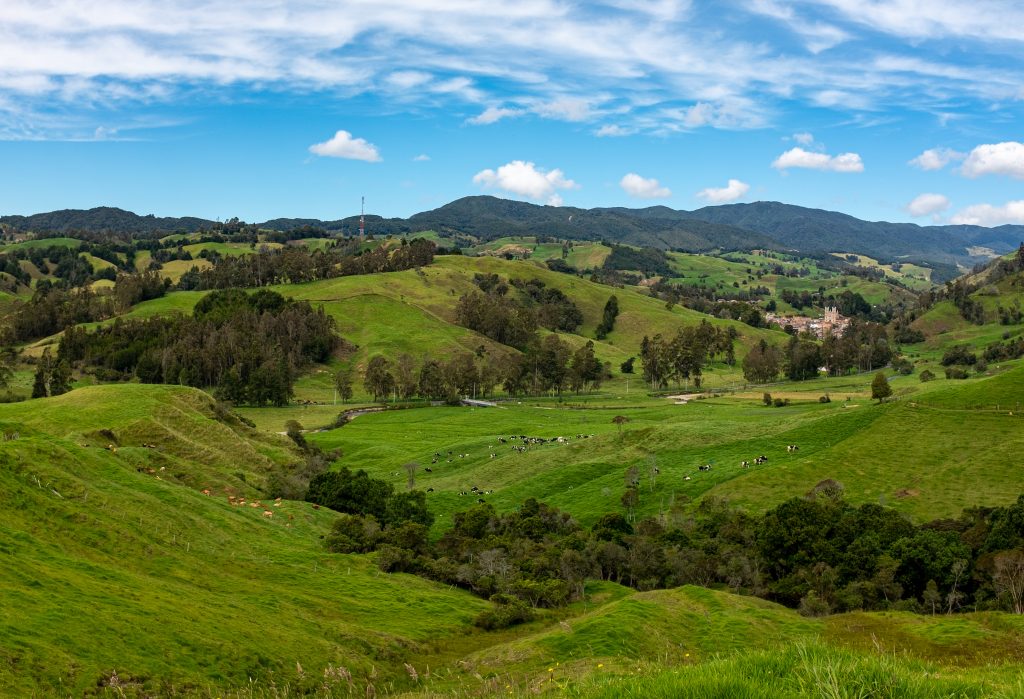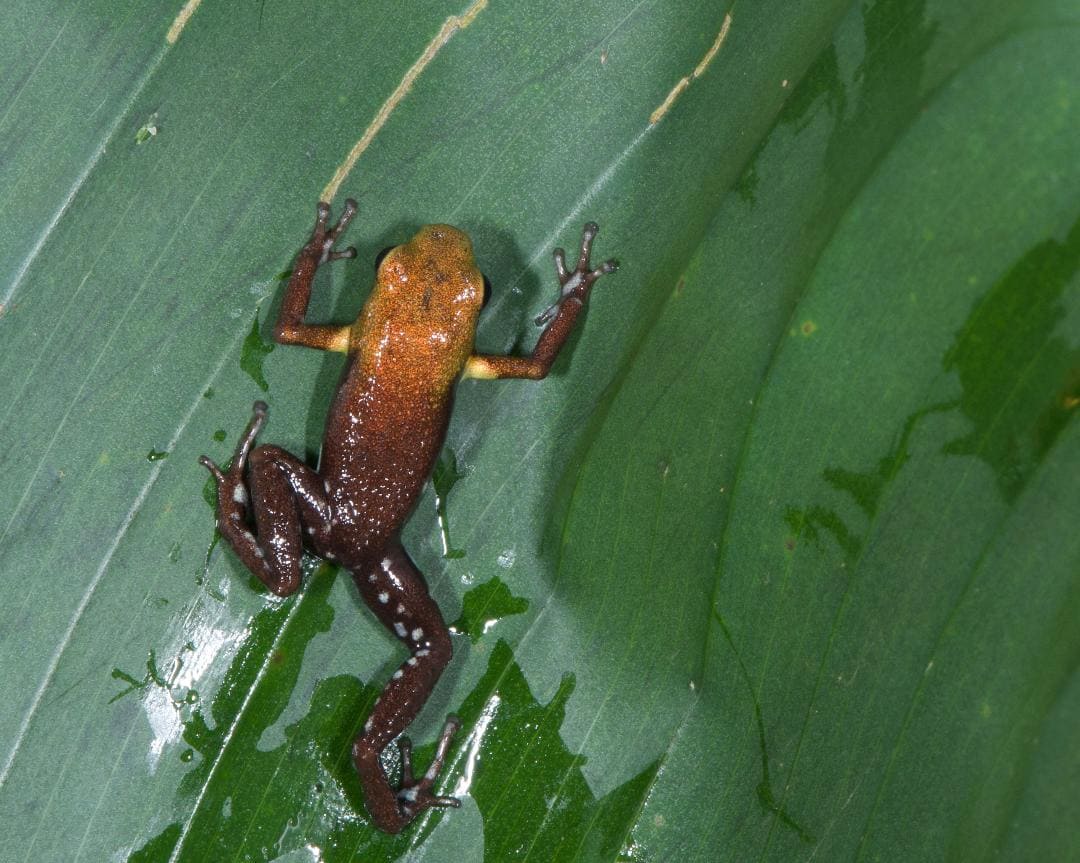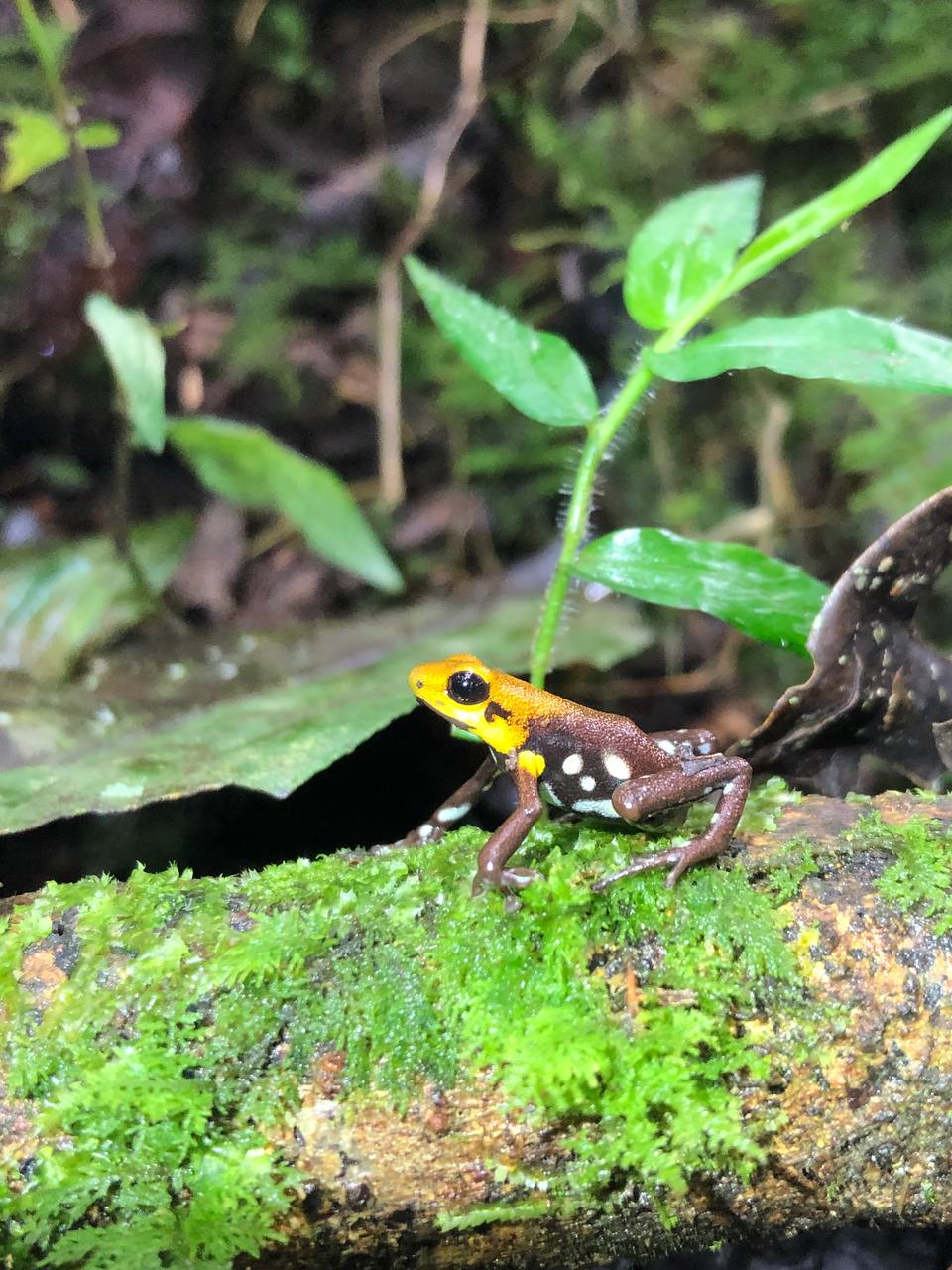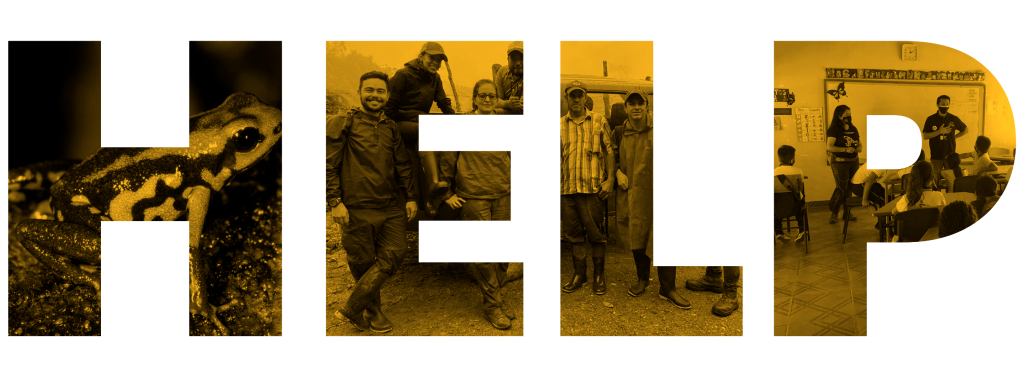Tolima farmers grow coffee while protecting a multicolored poison dart frog
Tesoros de Colombia Sustainable Farm supports 73 farmer families from the Casabianca municipality in Colombia who harvest quality grain and, at the same time, develop responsible practices within the habitat of the dotted poison frog (Andinobates dorisswansonae), a species of amphibian that only
lives in this sector of the planet (endemic). The Active Conservation Alliance is joining forces with Tesoros de Colombia to support this unique project.
It is unusual for agriculture and wildlife conservation to complement each other. Because it is frequently heard that many crop owners, in their eagerness to develop, cause intense deforestation or destroy the
habitat of many species. In short, the conservation of biodiversity and productivity do not always advance in the midst of an ideal integration.
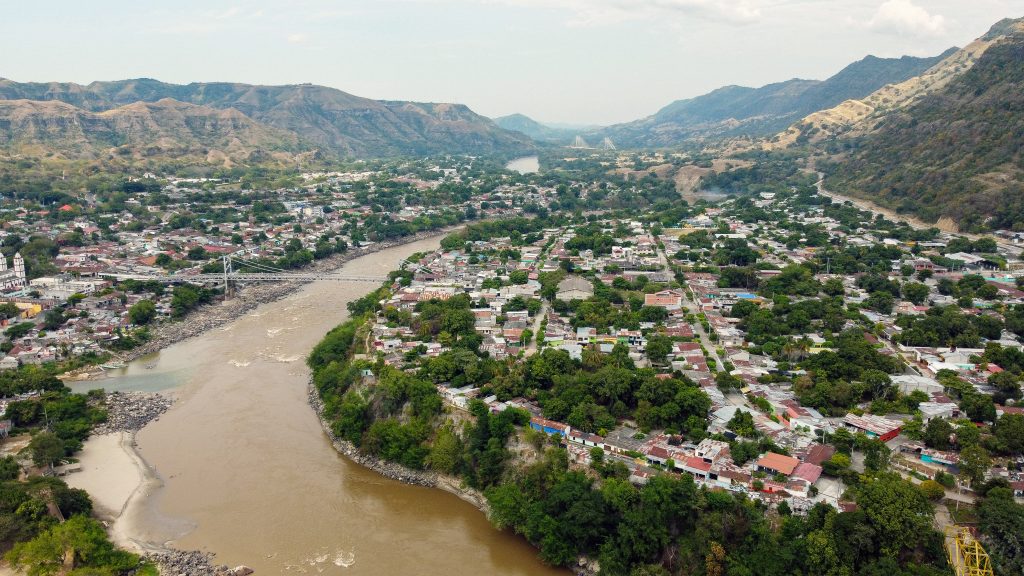
However, in the rural area of the municipality of Casabianca, in Tolima, there is an attempt to transform that premise and partially change history.
In a community crusade that strives daily to maintain its impact, and that is being supported by Tesoros de Colombia (a frog conservation project and farm), farmers from this municipality are growing high-
quality coffee, while taking care of the habitat of a unique species in the world, known as the spotted poison dart frog, seen only in this part of the planet (endemic) and standing out among the vegetation for its shiny, black skin, spotted with red, yellow, or orange dots.
They avoid burning, among other good practices
Coffee crops could represent everything that a frog like the dotted frog would reject to keep the leaf litter intact, forests with a good presence of bromeliads or water sources, some of the sites that form its main home and where it deposits and cares for its young tadpoles. For this reason,
the farmers, grouped within the Agromejora Association, are committed to consolidating the grain harvests, but as long as they adopt some responsible practices that respect the environment of the Andinobates dorisswansonae, the scientific name of the amphibian.
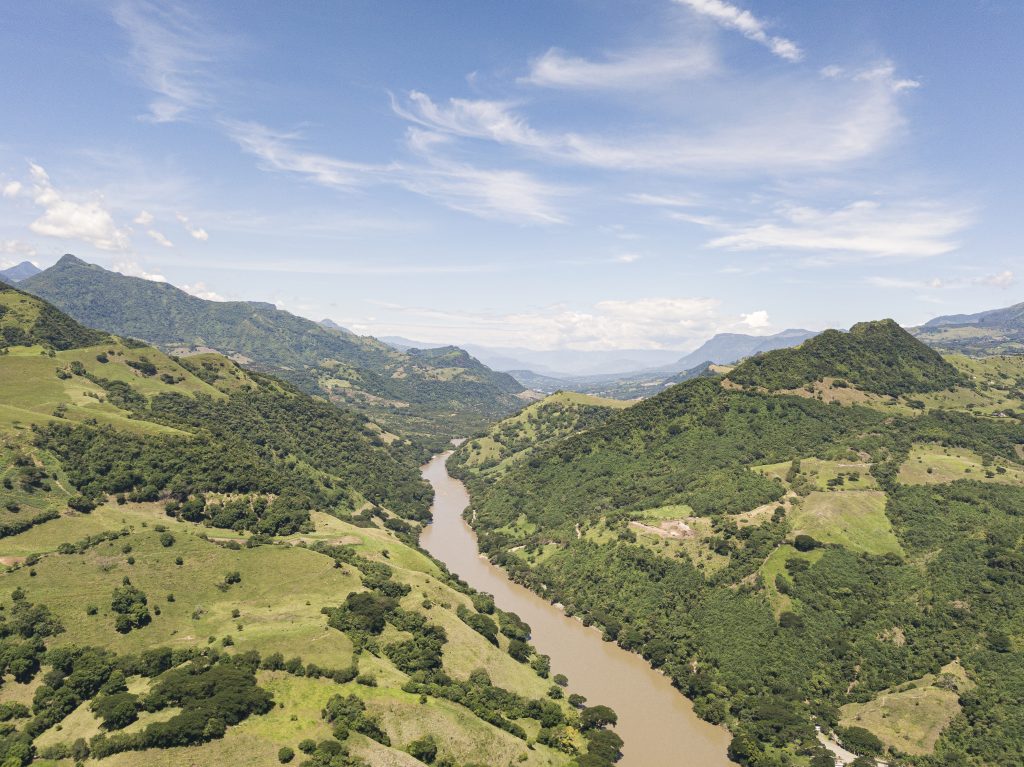
Óscar Buriticá, legal representative of the Agromejora Association, says that grain crops are grown from natural fertilizers, without using too much water and with drying process that does not use tools that could be polluting due to the use of fuels. “We are focused on avoiding chemical spraying; We don't burn either. And we respect the shores of the ravines or the places where the frog is”, he explains.
The Association was born in 2015 in the village of La Mejora, with no more than 15 founding families. Today, it is made up of 73 families that live in 26 of the 29 rural areas of Casabianca, including La Esperanza, the one that contributes the most members. All of them, together, produce at least one load of grain each month which is equivalent to approximately 250 pounds of parchment coffee, ready to be ground. A small part of the product is for domestic consumption, because most of it is sold under the Café Endémico brand, a name that honors the exclusive presence of the Dotted frog in the territory. Generally, it is packed in bags of 300 and 500 grams, either in seeds or in powder (soluble).
Buriticá says that the Association has always been willing to improve its processes, in order to increase the quality of the product, which was recently presented in Montenegro (Quindío), during a specialty coffee
fair —the first experience of its kind for the brand. — and in which Café Endémico stood out for its aroma and softness. "However, and despite the fact that it has been very well received, we know that we can
consolidate it as a high-altitude coffee (it is grown at an altitude of 1,800 meters), exclusive and unique in the country," says Buriticá.
And it has been in this step by step to improve the profile of the grain and its production, in which Tesoros de Colombia has joined the community to contribute to that objective.
A few months ago, for example, an agronomist, hired by Tesoros de Colombia, advised coffee growers on improving some processes. And in turn, the firm supported, at the same time, the redesign of the labels and bags in which the coffee is sold, so that they would be more graphically attractive. The product has also been taken, by representatives of Tesoros de Colombia, to cities like New York and Chicago, in the United States, in order to promote it and talk about the environmental experience accumulated in its manufacture.
Iván Lozano, manager of Tesoros de Colombia, explained that the company has a very clear objective and that is to help producers achieve the necessary registrations in Colombia and the United States to export coffee, and to continue accompanying the community in strengthening your business model. Today, Café Endémico is sold in Casabianca. Also, in the facilities of La Reserva Biopark, located in Cota (Cundinamarca). Likewise, it is usually taken to the city of Ibagué by order.
A community allied with conservation
This last part of the story could be defined as a win-win. Because, while the people of Casabianca have improved many details of their venture and have pledged to respect their agricultural frontier, halting its expansion —this as a condition for receiving the support that has emerged from Tesoros— at the same time, Tesoros de Colombia has been able to consolidate, also with the help of the community, its work focused on biocommerce and aimed at protecting the dotted frog.
This is necessary because the species is under pressure and in a Vulnerable state due to the loss of its forests, according to the Red Book of Amphibians of Colombia. Another problem that harms the stability of their populations is not only their reduced distribution—which increases their vulnerability—, but also the illegal trafficking of many of their individuals, who have been hunted to take them abroad and sell them illegally among collectors, aquarists or zoos. And, precisely, what Tesoros de Colombia seeks, with its presence in the region, is to stop this potential traffic. "This is how we have achieved it with other species, work with which we have defended, in turn, national sovereignty and its biodiversity, against the piracy that traditionally consumes our resources," says Iván Lozano.
For this, the process of consolidating the reproduction in captivity of the frog is advancing, in order to, in the short term, export its offspring legally to Europe, among other continents. This is one of the many
modalities of biocommerce (commercialization of goods and services derived from biodiversity), a set of activities endorsed by the Political Constitution of Colombia and regulated by the National Association of
Environmental Licenses (ANLA).
The idea of Tesoros — work that it is currently carrying out in other regions of the country — is to legally export individuals of the species born in its laboratory, so that their demand can be met. In this way, those who begin to buy it legally will stop tolerating irregular and uncontrolled captures in the Tolima forests.
Restocking to support the species survival
For the moment, and for this specific case in Tolima, the attempt has already completed a first phase of collection some parental stock, which was followed up by the Casabianca community —a few frogs were
captured to begin their reproduction. Also, a second phase has been completed, called 'management of specimens under professional and expert care'. And it is expected that, in 2023, the commercial phase can
be authorized by ANLA, which allows these copies to be sold in other countries and begin to stop their illegal demand.
As compensation for having been able to carry out the work, Tesoros de Colombia will lead a program to release and repopulate the species in its natural environment, to return to the habitat not only those few individuals that were initially captured, but also an additional and permanent quantity that will help consolidate a healthy population of the Andinobates dorisswansonae.
Two objectives are reinforced here: illegal trafficking is stopped through legal biocommerce and communities are supported with company resources, to actively involve them in the conservation of their
environment and their threatened species.
“We are very satisfied with the work we have done, in which our productivity has been combined with the scientific effort of Tesoros de Colombia, which may allow, in time, the long-term preservation of this frog that is so valuable to our environment" added Buriticá.
He recognizes that, in what has to do with his productive activity, it is necessary to perfect some details, so that the coffee harvest can consolidate. One of these challenges is summarized in the importance of
obtaining certifications that promote the commercialization of the Endemic Coffee, which would, in turn, allow obtaining resources to improve the sustainability of the landscape. This is perhaps an effort in
which everyone's desires are focused, including those of that very particular, dotted, poisonous and multicolored frog.
This project has been selected by the Active Conservation Alliance to be supported as it meets all the requirements directed to preserve an entire ecosystem and endangered species while engaging local communities in an active conservation program.
